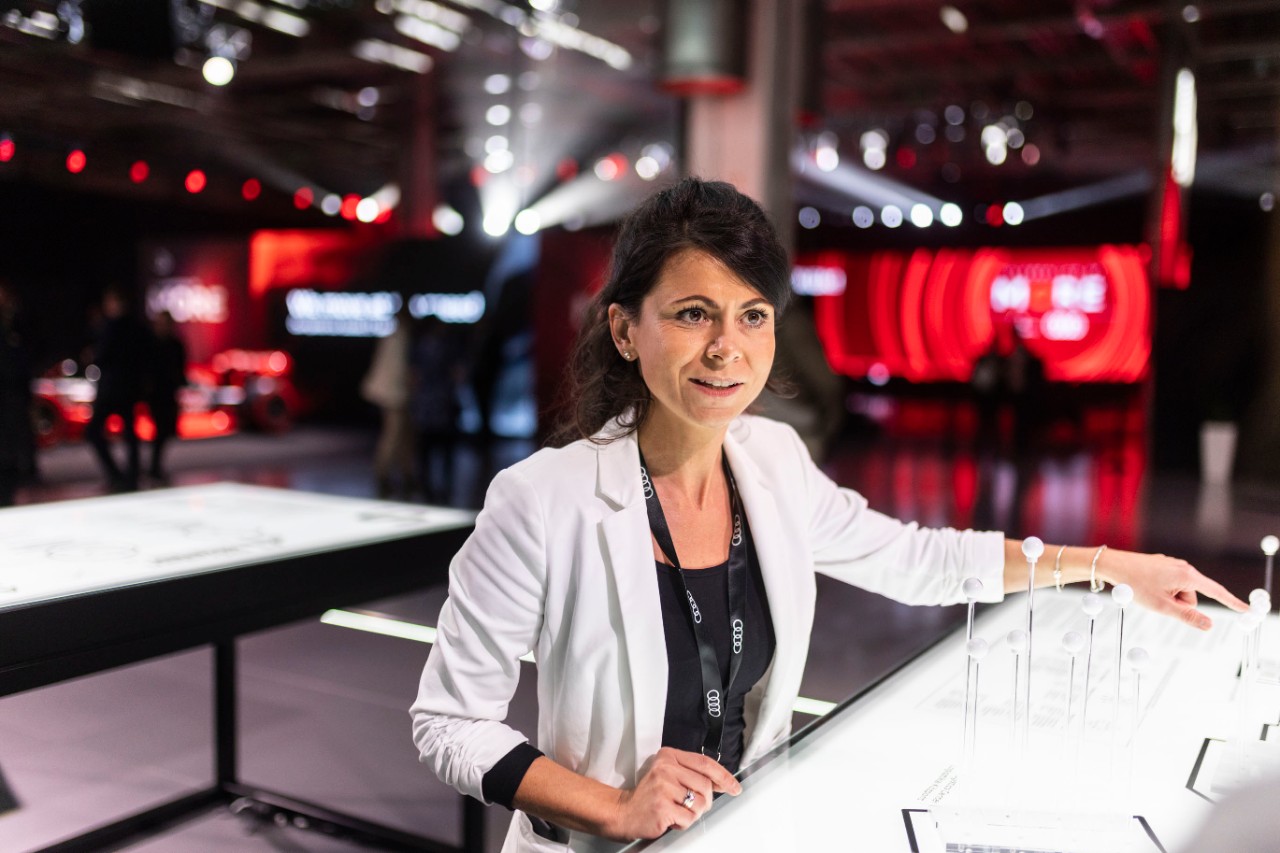Of the six stands in the NEXT LEVEL GALLERY, there is one more to discover. After getting to know the five strategic areas of Audi Hungaria, we are now approaching a topic that determines the company's current and future activities.
ESG stands for Environment, Social and Governance and provides a framework for objectively assessing the sustainability performance of companies. These parameters show how environmentally friendly, socially committed and entrepreneurially managed is a company, and how it will develop.
We have made an interview with Brenda Klein. She is Head of Accounting and Treasury at Audi Hungaria and is the lead for the ESG strategic area.
What is the role of ESG at Audi Hungaria?
Brenda Klein: ESG is of strategic importance to us. In short, it is our positive contribution to the world and thus it is firmly anchored in our Next Level strategy. Sustainability is not just a goal, but a basic attitude that defines our business. We use energy from Europe's largest rooftop solar park on the company premises, we are the largest user of geothermal energy in Hungary and our aluminum closed-loop process makes it possible to recycle aluminum in our production. We demonstrate our social commitment through a range of activities in which our employees volunteer their time and expertise to provide pro bono support to social and economic actors in the region. Our corporate governance is based on professional compliance and risk management activities as well as certified processes of the company.

Why is ESG so important for Audi Hungaria?
In addition to today's visible ESG successes, the credibility of external communication and reporting on ESG plays an important role and is therefore a key to success. To establish this credibility, the European Union will make ESG reporting mandatory for companies from 2024 and has adopted the Corporate Sustainability Reporting Directive (CSRD) for this purpose. For example, ESG data such as the proportion of renewable energy, recycling rates, anti-corruption cases, diversity, human rights processes at suppliers, etc. must be communicated on the basis of standardized assessment specifications. In addition, ESG data must be certified by an external independent auditor. In order to meet these high requirements, we need reliable and high-quality ESG data that is linked to our company processes and is consistently managed.
Is this the reason why the Lead for ESG is currently with you in Accounting?
Yes, exactly. At Audi Hungaria, the accounting department is responsible for external reporting that must be certified by an auditor. Until now, the focus of auditing has been on financial data. Accordingly, Accounting has so far been responsible for a financial data model. From 2024, however, around 1000 ESG data from the CSRD will be added. This is new for the external auditor, our accounting department and all departments at Audi Hungaria that have operative responsibility for individual ESG topics. Therefore, the preparation of our data management, our processes and our ESG officers is currently one of the biggest internal ESG initiatives. It is the basis for a successful annual audit and for a constantly uniform ESG management.

What professional competencies are crucial for achieving our ESG goals?
In particular, specialized accounting competencies are necessary to meet the CSRD requirements. In addition, competencies in the areas of ESG data management, Scope 1-2-3 emissions, supply chain due diligence, sustainable controlling and the derivation of targeted ESG strategies are particularly relevant. In addition to the systematic, internal development of these skills, we have a direct contributor to CSRD in our ESG team; our strategic partner, Professor Alexander Bassen. In the future, we will make use of additional external ESG training programs.
In addition to the successes mentioned above, what are the current ESG lighthouse projects of the Company?
In order to build up the ESG competencies just outlined, we have partnered with Széchenyi István University in Győr to establish Hungary's first ESG Master's Degree Program. With this initiative, we are making a significant contribution in the social field. In the area of corporate governance, we are building a multidimensional ESG data model in a modern IT architecture together with the Audi and Volkswagen Group, making it a practical pilot project for the entire Group. In the environmental area, we are continuing to expand our solar park and are also planning to use direct air capture technology to filter carbon dioxide directly from the air and then use it for other purposes or store it underground in a sustainable manner.

How can an area as elusive as ESG be shown at an exhibition? What exciting things have you come up with?
On the topic of the environment, we present the sustainable energy ecosystem and its impact on Audi Hungaria's carbon footprint. On the topic of social governance, we provided information about the joint ESG Master's Degree Program with the University of Győr, and thirdly, we presented our multidimensional ESG data model for governance here at the stand. I think that all three exhibits were very well received by the very interested guests and employees.


